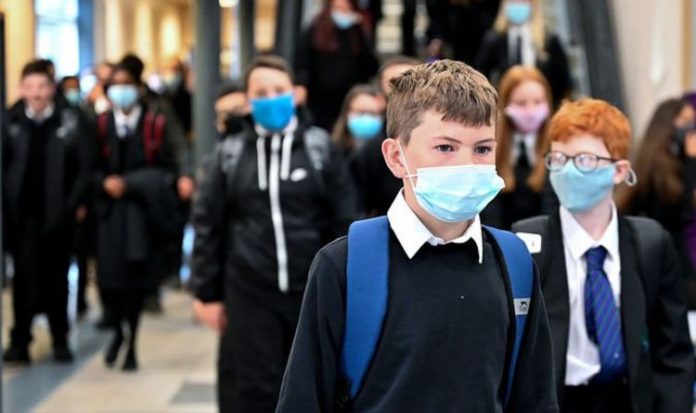
Masks must be worn in certain schools (Image: Getty)
Teachers have been told they must send pupils home if they cough at classmates, use another year group’s lavatories or even make jokes about coronavirus. Interfering with each other’s face masks is another huge concern. With many schools deciding it is unsafe to put badly behaved children together in detention or alternative classrooms, they will instead be sent straight home.
The new guidance from the Department for Education calls on schools to have a plan to deal with unruly children.
It states: “Schools should work with those pupils who may struggle to re-engage in school and are at risk of being absent or persistently disruptive, including providing support for overcoming barriers to attendance and behaviour and to help them reintegrate back into school life.”
While parents are increasingly nervous, school staff are said to be suffering from “extreme anxiety”, with almost nine out of 10 fearing that social distancing demands will prove impossible to achieve.
Schools were closed on March 30, remaining open only to the children of key workers such as NHS staff.
To check coronavirus levels in your area, fill in your postcide below.
All schools are asking pupils to go back to wearing uniform but some say it must be washed every day and others have said ties must not be worn to avoid infection.
Lockers will also be out of use, and when children have PE they must wear their sports kit all day.
Younger year groups will have to stay in the same classroom, even eating lunch at their desks, to avoid mixing with other groups.
Books and bags are banned in lots of areas with suggestion of leaving coats at home if the weather is fine.

Teachers have been told they must send pupils home if they cough at classmates (Image: Getty)
All secondary schools can choose to make pupils wear masks in corridors and other busy areas.
However, if there is a local outbreak, they will be required to make pupils in Year 7 and above wear them until cases subside.
Education Secretary Gavin Williamson’s political future – alreadyy hanging by a thread after the exams fiasco – depends on a successful full return of schools demanded by the Prime Minister.
Labour leader Sir Keir Starmer called on Mr Williamson to face Parliament to explain how he will protect children’s futures.

Schools should work with those pupils who may struggle to re-engage (Image: Getty)
He said: “He needs to explain how he will make up for the damage already done, bring pupils up to speed and mitigate against the ongoing risk from the pandemic.”
A survey of nearly 6,000 school staff found that more than a third felt the Government’s approach to safety “won’t work and will leave them at risk”.
And 28 percent of staff said they may not comply with the test and trace system if there is a coronavirus outbreak at their school, because they do not trust the Government with their data.
Schools reopening comes as a survey revealed the majority of pupils in England will be three months behind in their studies when they return to classrooms.
A poll of nearly 3,000 school leaders and teachers found that 98 percent felt pupils were not as far along with their learning as would normally be expected at the end of the 2019-2020 school year.
More than half (53 percent) of those teaching in the poorest schools in England reported their pupils were “four months or more” behind in their studies, compared with 15 percent of teachers in wealthier settings.
Almost a quarter (21 percent) of teachers from across more than 2,200 mainstream primary and secondary schools also believed boys had fallen further behind than girls.
Business groups say that the successful reopening of schools is vital for the economy.
Mike Cherry, the national chairman of the Federation of Small Businesses, said: “Many of the 16 million people who work in a small business across the UK have childcare responsibilities. That’s why the safe return of pupils to schools is critical to getting our small firms firing on all cylinders.”
Meanwhile, education unions are calling for a temporary ban on the £120 school absence fine.
Paul Whiteman, of the National Association of Head Teachers, said: “If you are a parent and worried about safety, a fine is unlikely to make you feel any safer.”
More than a quarter (26 percent) of parents said they were not planning to send their child back to school, while a further 20 percent remained undecided, according to a poll by charity Parentkind.
The Department for Education said fines will be used only as a “last resort”.







